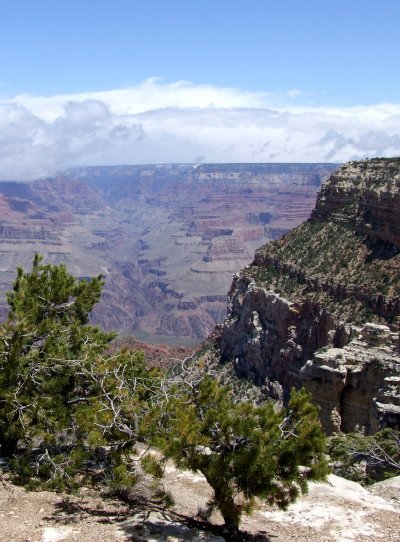Kaleidoscopes, Games, Sensationalism and the Age of Violence
This morning, I found myself "wandering" the web for a while, with no particular plan.
On my travels, I came a cross a fellow writer's very nice article about their Kaleidoscope collection. These sophisticated works of art were actually nothing like the simple kaleidoscope I used to have as a kid, but the article still brought back some nice childhood memories.

Grand Canyon, May 2013
I remembered how much I enjoyed my kaleidoscope (actually, I had several)-- taking it outside in the bright light so I could really see the brilliant geometric patterns form, as I turned the viewer. If you held it a certain way, it was almost all white; from a different angle, it was almost all color. It was actually one of my favorite toys, when I was 8-9 years old.
Not long after, I became a big fan of the Spirograph, a geometric drawing tool that served as one of the earliest inspirations for the art that has become my primary creative outlet.
On the next web page I visited was an ad for a new video game. As I looked at the rather "dark" imagery with lots of weaponry and bodies flying around, it really struck me that we seem to have become a much more violent society, just in the course of the past four decades.
So many of the current kids' toys and games seem to be centered around killing and destruction. Whereas I am well aware that it is "game play" and fantasy worlds... I just can't help but think that the violent focus somehow "conditions" us (and younger generations, especially) to "think nothing" of violent acts when they occur outside the confines of the virtual world.

Moonrise, Joshua Tree National Park
No, I'm not suggesting that "gaming makes kids violent," so much as exploring the possibility (or likelihood?) that these games of death and destruction cause a reduction in the ability to feel natural empathy for others...
The news media, of course, has long lived by an unwritten standard called "If it BLEEDS, it LEADS." Which is another way of saying that the most watched (or read) news stories are those of death and destruction-- or some manner of ridiculous sensationalism; the printed version of "click bait." Sensationalism and extremism get reported and are imprinted on people's minds... and think about it, Donald Trump got elected President in large part because he was able to constantly "keep himself in the news" with antics that struck many people's sense of outrage.
But as I said, it's a pretty old truism, so the idea that humans are attracted to-- or at least "fascinated by"-- violence and extremism is not exactly a new idea. That said, I don't remember such things as mass shootings in schools even existing, when I was a kid. Maybe they did?
Or did they? The Kent State shootings in 1970 (for example) weren't the result of deranged civilians with assault weapons, but actions carried out by soldiers. Maybe I've just forgotten... but I don't think so. In 1970, violence was more of a "collective concept" (as in war and nuclear bombs) than a "personal" one that happened in your community.

Chimney Rock at dusk, Sedona, AZ
The funny (or ironic) thing is... we seem to spend an awful lot of time engaged in discussions about how we are going to attain "World Peace." War is a "bad" thing we say; it kills our fine young people; it wreaks havoc on the planet and its peoples. Most people agree this is true.
And yet? We not only choose to surround ourselves with "death and destruction" by tuning in on the TV, we choose it (through gaming) seemingly recreational purposes. But the simulated death and destruction appears to be becoming more and more real, to the point where it feels like it is "bleeding through" and getting reflected in "real life," and some find it increasingly difficult to maintain a clear boundary between what is real and what is virtual.
Maybe I am way out in left field... but how can we possibly hope to reach peace, when we so readily surround ourselves with violence... even if it is "play" violence? Could it be that part of the answer in the world has to be that we start at home... by removing some of the violent imagery from our daily lives?
Of course, some might argue that these violent expressions are "just who we are;" that it is human nature. Maybe it is-- to a degree-- but my counterpoint would be to question whether this particular expression of "who we are" is actually growing out of an increasing level of anger and frustration over the growing inequities of the world. You know, even hornets are pretty peaceful till you poke their nest with a stick... and it seems like our "nest" is getting poked a lot, these days.
What do you think? Is the violence in "recreation" (from games to movies) a influencing how people conduct themselves outside the entertainment angle? Is our increasingly violent society merely "a sign of the times?" Do you think a steady diet of violent entertainment and gaming eventually deadens a person's ability to feel empathy for others? Do you think violence-- and even death-- has been "cheapened" to the point that more and more people no longer think of "killing" as nearly as serious an act as they did, 50 years ago?
I think that the saturation of our media world with violent imagery is a result of the increasing violence in the world. I have been unable to conclude whether I believe that violent imagery/media stimulates people towards violence. I have heard eloquent and convincing arguments on both sides (yours included). I do think that there is a profound desensitization that occurs, as frequent exposure --> the assumption that these things are commonplace --> less inflammatory reactions. Thank you for your exploration of this topic.
@danigirl, thanks for sharing your thoughts... I feel it's an important debate/discussion. And I'm interested in rooting out the underlying reasons we feel a "violent response" is OK, as opposed to unacceptable.
Indeed, it acclimates us to secondary, pseudo-experiences of horrible things that we mirror and project as what reality is. That might desensitize us prior to experience, but if we experience it by creating it there is a difference in terms of actual reality vs. a simulated reality they gain through a secondary experience. Everything influences us, regardless of them being our own experience or a written, audio or video real or fictional experience. That's my take.
I agree. But in the future with google glasses and ever more sophisticated 3-D technology the boundaries between virtual and real might blur so much subconscious at least will no longer discern any difference. We might get PTSD from watching a war movie or playing a video game
I fully agree with you, our western society has indeed become more accepting of
all kinds of violence.
The question is, is the media violence a reflection of real life violence or is the the other way around. My guess it is both, however like you I believe that the glorification of violence in the entertainment and use media does have a great influence on our collective psyche and certainly not for the better.
@evehuman, I am not convinced people are inherently violent, but I do believe some react violently to situations they don't like... and the glorification of violence in entertainment "normalizes" such a response to where violent acting out happens with less restraint than it used to.
this sounds reasonable
This post has been ranked within the top 50 most undervalued posts in the first half of Feb 16. We estimate that this post is undervalued by $3.93 as compared to a scenario in which every voter had an equal say.
See the full rankings and details in The Daily Tribune: Feb 16 - Part I. You can also read about some of our methodology, data analysis and technical details in our initial post.
If you are the author and would prefer not to receive these comments, simply reply "Stop" to this comment.